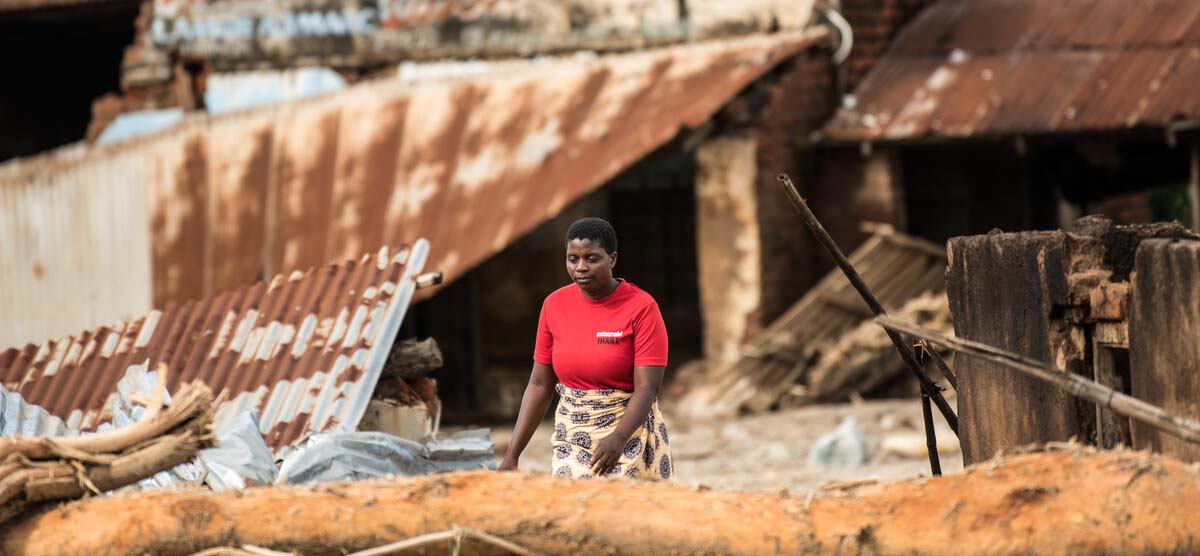New research by the humanitarian organization, ActionAid, has revealed a shocking 93% of countries at the forefront of climate disasters are drowning in debt. The organization is calling for the most climate-vulnerable countries to have their debts canceled, along with a radical reform of the way global debt is managed, to stop this crisis.
With countries forced to pay back their debts to the World Bank, International Monetary Fund (IMF), and private banks before spending on anything else, the new research raises worrying questions about how these countries are affording to rebuild, adapt and mitigate against frequent and intensifying climate disasters.
The newly published policy brief ‘The vicious cycle: The links between debt crisis and climate crisis’ by ActionAid found:
- Nine countries most vulnerable to climate change, including Somalia, Malawi, and Mozambique, are already in debt distress.
- 40 climate-vulnerable countries are at moderate or high risk of debt distress.
- Only four countries being impacted by climate disasters are at low risk of debt distress.
The research comes as the IMF and World Bank 2023 Spring Meetings start today, where economic policy options for Global South countries will be under the spotlight.
Malawi is a country ravaged by the recent Cyclone Freddy, which displaced more than half a million people and destroyed buildings, roads, and homes. Pamela Kuwali, Country Director at ActionAid Malawi, said:
“Malawi faces a debt which is nearly two thirds of its gross domestic product which means instead of our government being able to channel vital finances to rebuild and recover after Cyclone Freddy, instead to we are being forced to pay back old loans. Our hands are tied, and all the while climate disasters are becoming ever more intense and destructive. This can’t continue, and it will be women and girls who suffer the impact the most.”
The research also found that 38 out of 63 most climate-vulnerable countries are already spending so much on debt servicing, they are likely to be cutting spending on public services.
John Nkaw, Country Director at ActionAid Ghana, said:
“Ghana is having to spend more on servicing its debt than it spends on education and health. It’s a vicious cycle because cutting public expenditure means the country doesn’t have as many resources to respond to climate disasters when they do hit. We can’t invest in adaptation or resilience, and we can’t appropriately prepare for or respond to climate-induced disasters.
“We know that Ghana will need about 60% of its debt canceled if it is to return to a path of sustainability – therefore, we demand a proportion of debt cancellation. If freed of debt, we would be able to strengthen small and medium-sized businesses and invest in renewable sources of energy, smallholder farmers, and agroecology. But these choices aren’t an option.”
The vicious cycle continues with countries needing to repay these debts in foreign currencies, mostly US dollars. To get this quickly, countries are often driven to invest in extractive industries like fossil fuels and invest in large-scale industrial agriculture, which is harmful to the environment and contributes to climate change.
David Archer, ActionAid International’s Head of Programmes and Influencing, said: “These debts are locking countries into a negative spiral – forcing governments to resort to cutting public spending and investing in things which aren’t good for the climate to pay back their debts.
“It’s crucial we spotlight how the World Bank, IMF, and private banks based in wealthy countries are preventing climate progress as they continue to enforce strict conditions around debt repayments on climate vulnerable countries at any cost.”
He added: “It’s time for the most climate-vulnerable countries to have their debt canceled so we break free of this harmful cycle.”
ENDS
For media requests, please email Jenna.Farineau@actionaid.org or call 202-777-3668.
We have spokespeople available, including David Archer and John Nkaw.
To read the policy brief, contact the press office.
Notes to Editors
More on Ghana’s debt
Ghana defaulted on its $28.4 billion external debts in December. About 42% of that was domestic debt, which Ghana has restructured its domestic debt through a domestic debt swap. In January, Ghana applied for debt relief through the G20 Common Framework, widely criticized for very slow progress. Ghana is waiting for board approval for a three-year Extended Credit Facility (ECF) agreement for $3 billion with the IMF. ActionAid is among CSOs calling for debt cancellation amid crisis in a January letter.
About ActionAid
ActionAid is a global federation working with more than 15 million people living in more than 40 of the world’s poorest countries. We want to see a just, fair, and sustainable world in which everybody enjoys the right to a life of dignity and freedom from poverty and oppression. We work to achieve social justice and gender equality and to eradicate poverty.


